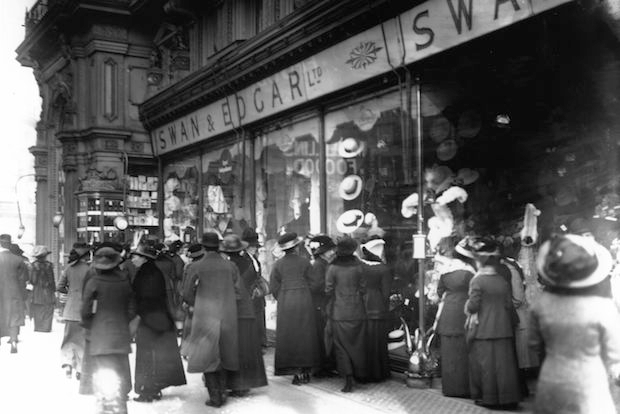From ‘Pages of War’, The Spectator, 27 February 1915:
With its darkened lights and sparse traffic, its khaki-dotted clubs and restaurants working at half-pressure, its transformed shop-windows, where everything is “for the front,” London was yet never so absolutely, so intimately itself.
All the distilled essence of the Empire is concentrated here under these foggy skies swept by wheeling searchlights. As though in the full pageant of mid-season, the cream of the shires and bigwigs from the unfamiliar counties pass and repass along pavements where no alien jostles them off the kerb, magnetized every one of them from their homes by haunting, mute anxiety to keep their finger on the pulse of the world’s supreme news-centre.
There has even sprung up a sort of silent freemasonry among these pilgrims indecently and irresistibly wrenched from their normal land-owning existence. The dainty blue serge that hurries, clasping a huge bunch of Parma violets, towards the iodized atmosphere of Welbeck Street, has almost a smile—a flash of tears and courage—for the mother who returns empty and heavy-hearted yet humbled to thank God for her uncertainty from the War Office.
Charming fashionables gliding to foolish committees glimmer appreciation from deep-seated, shadowy limousines to young men obviously home on leave. Even the majesty of St. James’s has abated its serene hostility to an almost perceptible welcome for the stranger who is, after all, of its own blood. Revelling in the brief freedom of his civilian clothes and proudly secure in the consciousness of accumulated pay, the Subaltern just home from the front, and on his way to entertain a little party at the Savoy, boldly faces the velvet hush of the Dover Street dressmaker’s, and without flinching signs a cheque for the prodigious sum which the half-interested saleswoman quotes. An exquisite, frivolous thing, this theatre wrap of subduedly glittering scales which he has bought for the lady of his choice. Reassure yourself: she is his mother, ever young and ever lovely, one of those supreme women who smile smooth-cheeked and confident, with something like death in their hearts, at the receding boat-train—the Mother of the Gracchi, dressed by Poiret.






Comments